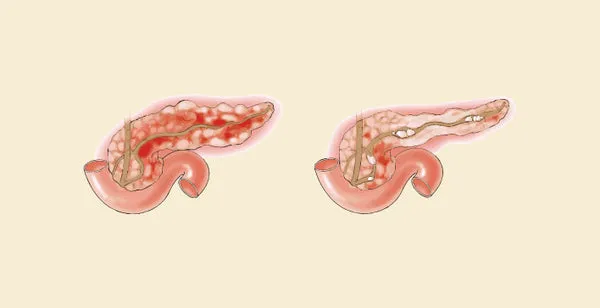The pancreas stands essential for digestion because it generates digestive enzymes while it controls blood sugar through insulin release. The medical classification of pancreas inflammation is known as pancreatitis. Pancreatitis follows two different presentations as chronic or acute forms with different reasons and medical approaches to their management. Effective treatment along with complication prevention for pancreatitis requires awareness about the distinct characteristics of acute versus chronic forms of the disease.
Acute Pancreatitis
Pancreatic inflammation that occurs suddenly leads to acute pancreatitis which causes intense stomach pain together with gastrointestinal dysfunction. People typically recover from this condition through medical care although severe side effects might appear occasionally.
Causes of Acute Pancreatitis
Various substances trigger acute pancreatitis including gallstones together with excessive alcohol use and blood triglyceride heights and specific medicines or infections.
Symptoms of Acute Pancreatitis
The main indicators of acute pancreatitis entail intense abdominal pain centered above the waist which extends to the back while patients experience nausea followed by vomiting together with body fever and quickened heart rate as well as abdominal swelling and tenderness.
Diagnosis and Treatment of Acute Pancreatitis
Medical identification of acute pancreatitis occurs by analyzing blood amylase and lipase concentrations in addition to utilizing CT scans, MRI, and ultrasound imaging. If you experience symptoms of this condition, it is essential to find a gastroenterologist for proper diagnosis and treatment. The treatment includes hospitalization to receive IV fluids and pain control while fasting enables pancreatic rest so healthcare providers can gradually reintroduce bland foods while treating any root causes of the condition.
Chronic Pancreatitis
Long-lasting inflammation of the pancreas results in permanent tissue destruction that defines chronic pancreatitis. Chronic damage to both digestive and metabolic functions becomes permanent because of this condition.
Causes of Chronic Pancreatitis
Long-term alcohol abuse coupled with genetic inheritance and autoimmune diseases along with recurrent acute pancreatitis attacks usually leads to chronic pancreatitis.
Symptoms of Chronic Pancreatitis
The main symptoms of chronic pancreatitis include frequent abdominal pain together with weight loss and poor nutrition and steatorrhea from improper digestion and diabetes from damaged pancreatic function.
Diagnosis and Treatment of Chronic Pancreatitis
To diagnose chronic pancreatitis doctors use a combination of imaging tests including CT scans and MRI and ERCP alongside tests to measure pancreatic enzyme output. The treatment methods focus on alcohol and smoking abstinence as well as pancreatic enzyme supplementation to improve digestion with medication-based pain management alongside surgical removal of damaged pancreas tissue as a final option.
The main characteristics which distinguish Acute from Chronic Pancreatitis
Acute pancreatitis happens quickly yet resolves itself within a short period while chronic pancreatitis emerges slowly and causes lasting harm to the pancreas. The main trigger for acute pancreatitis is gallstones along with alcohol consumption yet chronic pancreatitis develops primarily because of extended alcohol abuse and heredity and recurrent acute exacerbations. The symptomatology of acute pancreatitis manifests as extreme pain and nausea alongside fevers but chronic pancreatitis produces enduring pain and digestive distress together with weight loss. Hospital treatment stands essential for acute pancreatitis yet patients with chronic pancreatitis need to make life-long modifications along with enzyme treatment and surgical intervention.
The Care of Pancreatitis Demands Changes to Both Lifestyle and Diet Plans
Within pancreatitis management people need to control their daily routines together with their eating habits.
Dietary Changes
Small and frequent eating helps digestion better and a low-fat diet plan is suggested for patients. Eating healthy proteins in combination with nutritious foods assists pancreatic health by limiting exposure to processed foods together with reducing excessive sugar consumption.
Lifestyle Adjustments
Alcohol consumption as well as tobacco use should be completely avoided because they contribute to additional pancreatic injuries. Excellent hydration practice together with proper management of diabetes and high cholesterol requires constant attention.
Medical Follow-ups
The best Gastroenterologist in Karachi checks and pancreatic enzyme and blood sugar level monitoring under medical supervision help patients effectively manage their pancreatitis condition.
Conclusion
Pancreatitis in both acute and chronic forms generates substantial harm to digestion health and overall physical condition. Current evidence shows that acute pancreatitis typically has a temporary course which medical professionals can treat but patients with chronic forms must undergo permanent lifestyle modifications and receive long-term medical care. Early symptom identification and using proper prevention methods including diet adjustments and alcohol avoidance helps reduce related complications. Medical assistance is crucial when you experience ongoing stomach pain or digestive symptoms because they need proper medical diagnosis and appropriate treatment.
